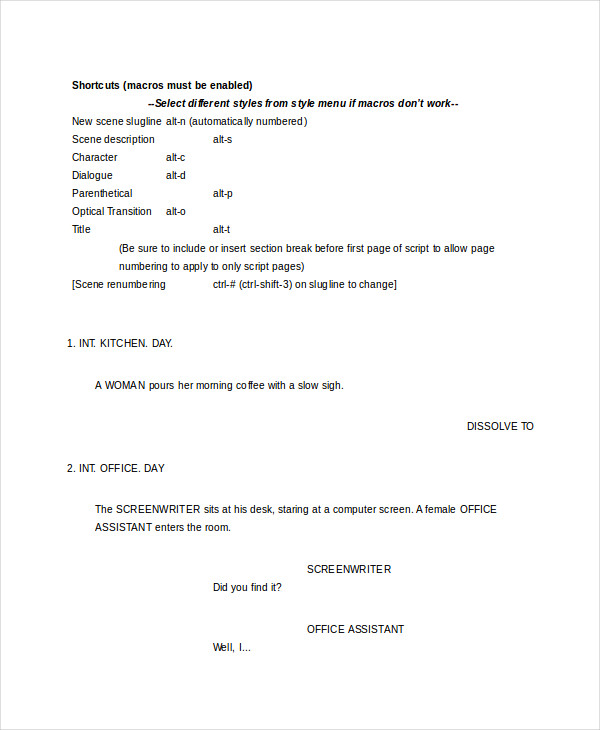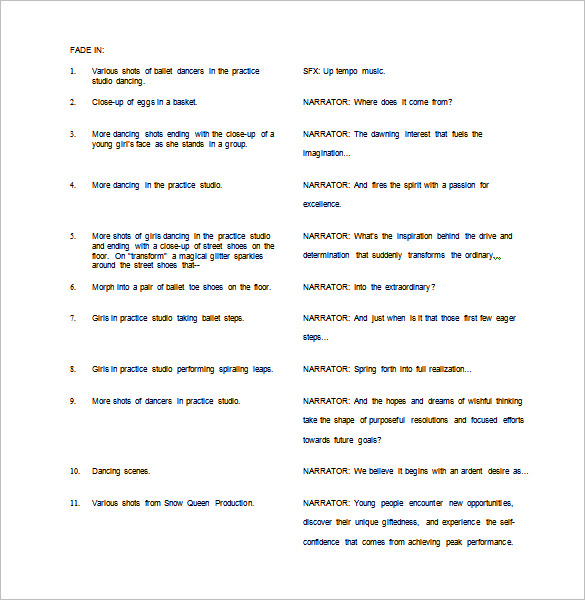
Putting the background information in the cast script helps an actor understand what’s really going through their character’s head without cluttering the script for the other actors.Ī quick list of things that I’ve seen writers do that you should avoid: One of our characters typically has much more on his mind than he’ll say out loud, and he’s also often lying. This means that the column might not apply to you, depending on how you’ll record–but it’s integral to our production.Īnother thing you can do for the individual cast scripts is use them to add more direction for a specific character if that character keeps their motives secret.
G docs movie script template how to#
VALENCE uses both live read recordings and recordings the actors do asynchronously, which we’ll discuss in a later edition of How to Audio Drama. Having a checklist helps actors stay organized, and helps them set expectations as they read the script. Starting on page 2, we have a checklist of every single scene that character is in, how it’s being recorded, and a space for them to check off if they’ve submitted the audio: On our second page, we give some other guidelines that are specific to our production, including a link to our reporting policies, how many takes of each line we’d like, etc.īut then comes the real crown jewel of the individual cast scripts: the checklist. Having the dates right on the cover page means they’re clear, and actors can reference them whenever needed. Each individual cast script has a cover page with the following, and our show’s art for season 2: For our second season of VALENCE, we made cast scripts for all our major, minor, and ensemble (more than ~5 lines) characters. Once all of your scripts are completed, individual actor scripts are a great way to give actors information they’ll need for your production. You do not need tone direction on every line, but you should give tone direction on lines that can be read in several different ways if you want the actor to go for a specific delivery. This means that when writing, you should make things as clear as possible for those involved without being distracting. You might not hear the sound of someone smiling, but you will hear it in their voice.Īt the start of your script writing process, it’s unlikely–and inadvisable!–to have your audio drama cast. Treating your audio script like a script for a visual medium increases the sense of realism, and often informs both actors and sound designers on the physicality of a scene. I do highly recommend writing stage directions, even when the audience won’t necessarily hear every action that they would see. The best way to know what your sound designer needs is to be direct and ask them. I’ve worked with sound designers who would want the sounds actually described (“SFX: Room tone, typing on a laptop”).
G docs movie script template tv#
When I’m doing sound design, I prefer stage directions to be written as though they were for a film or TV show (“Wil sits at their desk, typing”). What matters is that it’s easy to read and it makes sense.Įvery team is different. If you think you have a formatting idea that makes more sense to you, talk to your team, but it’ll probably be just fine. yeah, I think this is a good example of writing a script.īoth of these formats work fine. yeah, I think this is a good example of writing a script.Īnother format you’ll see often left-justifies everything and uses colons to separate the character and their dialogue: One of the most common you’ll see is taken from traditional screenplay formats, and centers the dialogue: Let’s look at two of the most classic formats when writing a script. The best way to go about this is to ask your team what makes the most sense to them. You don’t have to know the most traditional or classic way of writing a script for it to be understood by your team.



The most important thing to do when writing a script is to make it clear to everyone involved–to you, to any other writers, to the director, to the actors, and to the sound designer. There are, however, many ways not to write a script.

So, how did we write our scripts? A lot of mistakes.Ī lot of mistakes that you can learn from.įilm and theater students might disagree, but in my eyes, there’s no single right way to write a script for your audio drama.


 0 kommentar(er)
0 kommentar(er)
